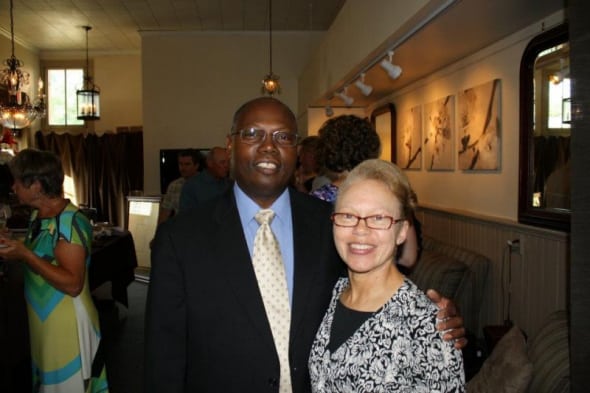
“There’s so many different things flying around, you can hardly keep track or make progress on anything. I guess some might say, maybe, that’s a part of the strategy of the principalities and powers,” author and activist Shane Claiborne says with a faint laugh as we begin to discuss his arrest at a DACA-related protest in Washington D.C. last week. “And I think that’s why it’s important not to just be fighting the system but to name the system and name the collateral damage of it. That’s what DACA does, it makes this very personal, puts names with faces on it.”
On December 5, a peaceful demonstration, organized by different faith groups including the Christian Community Development Association (CCDA), in support of the Deferred Action for Childhood Arrivals immigration policy (DACA) was interrupted by law enforcement. The police arrested several faith leaders, including Claiborne, for staging a prayer vigil as an act of civil disobedience that culminated at the door of Senator Paul Ryan’s office.
Established by the Obama administration, the policy allowed for some people who immigrated to the U.S. as minors to defer deportation and obtain work permits.
Earlier this year, the Trump administration announced plans to rescind DACA, raising questions—among other responses—about the fate of thousands of DACA recipients currently residing in the U.S.
The protest was aimed at urging lawmakers to favor legislation that would protect 800,000 young people from deportation.
We talked with Claiborne about what happened that day.
RELEVANT: Before we get to the demonstration, so much is happening in the news that it’s hard to keep track on the progress of any one issue if you’re not looking really closely. Could you just do a quick overview of where we are on this issue? What’s going on with DACA?
There are probably people who have a better pulse on that than me, probably [CCDA President] Noel Castellanos who organized the event in DC.
But my understanding is that the time on [the current DACA decision] expires in March and so in that sense, inaction will mean the end of DACA for many folks. So that’s why there’s an urgency about it.
A lot of folks are hoping that something will happen before the end of the year, even an extension of DACA or something. Really, what I think people are fundamentally wanting is comprehensive immigration reform that can actually provide a path to citizenship in a way that these 800,000 dreamers and all of these immigrant families can actually find a way forward because it sort of feels like we keep patching [same] this hole in the [same] tire …
And immigration is so dysfunctional … we really just need comprehensive reform that can [discern between] folks [who just want] to get citizenship and folks who are dangerous. No one is just saying fling open the borders.
But I’ve got friends who have been here for 10 years as pastors and missionaries and still have to go back to their country of citizenship … I mean they’re volunteering, leading movements, pastoring churches—much less someone fleeing persecution or poverty or war. I think that’s why we’ve seen groups like the NAE—the National Association of Evangelicals—and so many others—we’re not just talking about progressives—that care about immigration. I think [people care] across the board and [it’s different] parties and politics and theologies that are saying, we can do a better job of welcoming people into our country.
RELEVANT: Let’s talk about the other day in D.C. You were there as a part of a demonstration. Who was gathered, and what were you guys demonstrating for?
There were lots of different groups that converged that week around DACA and “dreamers” and immigration. And my understanding is that folks were expecting several hundred people to do similar actions like the one I was a part of.The specific action that I was a part of was affiliated with CCDA, the Christian Community Development Association, and they were calling it Camino de Suenos [Spanish for “Path of Dreams”].
Young folks who are recipients of DACA were there and had gathered along the way, along the camino. Hundreds of dreamers and immigrant families and others [had written] 2,600 or more dreams on pieces of paper [and put them] in these beautiful containers that they had made, and we delivered them to Paul Ryan’s office. And we prayed over those dreams and lifted them up, then we poured out those dreams in front of Paul Ryan’s office door and then we knelt in prayer.
We read many of them aloud. It was so powerful to hear folks saying [things like] “I want to be able to raise a family”; “I want to live without fear”; “I want to be a schoolteacher.” All of these different things that people wanted to contribute to and do in the future, many of them were DACA recipients.
Then we were confronted by the police and given three warnings. We were warned but continued to pray and read the dreams aloud. Then we were arrested. As soon as we were arrested (there were 12 of us and these are mostly, if not all, pastors and faith leaders) we sang
“Silent Night.”
It was really powerful in contrast to all the hustle and bustle of the police. I mean there’s probably 20 or 30 police there and we sang “Silent Night,” remembering [that] Jesus [was also] born in a really desperate time … [as] a displaced Galilean, in a manger because there was no room in the inn. All those connections were there and it was very powerful.
We were taken into custody and basically fined $50, and after a few hours we were released. I did ask them what would happen if we did it the next day. They said, “You don’t wanna ask questions like that” or something like that. But to be honest, one of the officers even said, “You know we’re with you and we really hope something happens, we hope [the Dream Act] goes through.”
So it’s a very good spirit about it. And I think there’s a lot of people inside and outside of the system that think we have a really urgent problem.
RELEVANT: So what’s next on this?
I think we’ll see more and more movement, we’re doing a lot of things locally. We have a new powerful movement called the New Sanctuary Movement, which is organizing in solidarity with immigrant families and refugee families in Philly. We’re trying to make sure that our city continues with its momentum as a sanctuary city. And we kind of have an ICE (Immigrations and Customs Enforcement) alert that, if a family is facing a need or being pulled apart by federal agents, then there’s an alert that goes out and hundreds of folks are trained in solidarity and have a non-violent response to that. I think we’ll see a lot more of that, my understanding is that that’s happening in California and other places too.
But we have to see something happen at the federal level on this. We need to see some changes and not just keep stumbling forward. We really need some courageous leadership that can really say, yeah [policy] is a part of loving our neighbor as ourself.
I think we need to counter the issue [but] not as a political issue. This is a love your neighbor issue. This is an extension of what that really looks like. It’s got names and faces; I mean this isn’t just an issue to debate. [I emphasize that] because you could talk about it in an abstract way. But at the end of the day, the immigration issue is about Alejandra, it’s about Jose, it’s about people we know in our neighborhoods that are living with a lot of fear and uncertainty of their futures.
***
Those who are moved to defend DACA can do so by contacting their Congressperson and letting them know they are against the decision to rescind the policy.






















